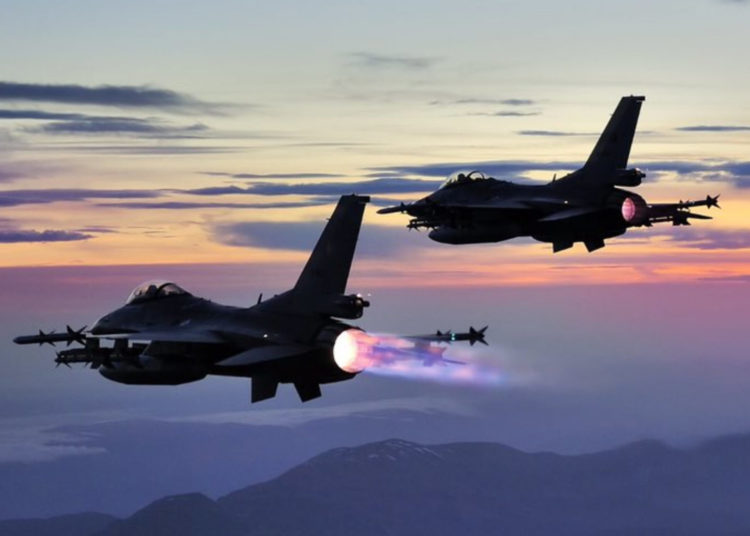Nordic Monitor
Classified documents obtained by Nordic Monitor have revealed how the Turkish military was prepared for the shooting down of any Russian fighter jet violating Turkish airspace in the aftermath of another incident that took place in November 2015.
According to the classified minutes of a military consultation meeting held on June 3, 2016 in Ankara, Hulusi Akar, the then-chief of general staff and current defense minister, underlined the fact that another Russian aircraft could have been attacked by the Turkish armed forces in the event of an airspace violation due to the rules of engagement.
On November 24, 2015 a Russian Sukhoi Su-24M was struck by Turkish F-16 fighter jets near the border with Syria, close to where Turkey’s Hatay and Syria’s Latakia provinces meet in mountainous terrain. The downing of the Russian jet caused a diplomatic row between the two countries, with Russian President Vladimir Putin calling it “a stab in the back,” until Moscow and Ankara agreed to restore relations in June 2016.

Akar put forward at the meeting that Turkish borders were closely monitored by the air force in accordance with the rules of engagement that were declared after the downing of a Turkish jet in 2012, and Turkey was prepared to shoot down another Russian jet if one happened to violate Turkish airspace, the minutes revealed. However, the rules were changed following a Russian-Turkish agreement in line with NATO’s “intention” principle, Akar stated. It is not clear when exactly Turkey changed its rules of engagement.
The NATO Rules of Engagement ensure that “any military actions or dispositions would be fully in consonance with the aims and intentions of the Alliance” and that the principles “should be applicable to all situations ranging from peacetime operations through increasing tensions to hostilities short of major aggression.”
Following the agreement on rapprochement between Moscow and Ankara, Turkey’s ruling Justice and Development Party (AKP) members started claiming that the government did not order the Turkish air force to down the Russian jet but rather maintained that the pilots acted on their own. The two pilots were accused of shooting down the Russian jet on their own initiative and were arrested in the wake of a coup attempt on July 15, 2016 on dubious coup plotting and terrorism charges.
Relevant pages from the Turkish military meeting minutes. Some sections of the texts were colored by the officers who submitted the minutes to the General Staff for review:
Interestingly, the speech of Turkish Foreign Minister Mevlüt Çavuşoğlu at a panel discussion at the World Economic Forum in Davos, Switzerland, on January, 22, 2020 appeared to be a radical reverse of Turkey’s official discourse on the downing of the Russian Su-24.
Çavuşoğlu was the first cabinet member to state that the Russian aircraft was attacked by the Turkish pilots in accordance with a government order, saying: “We were totally on opposite sides in the beginning, and we [Turkey] even shot down a Russian fighter jet. After what we saw in Aleppo, we [Turkey and Russia] agreed to work together.”

Nordic Monitor previously revealed Turkish military documents confirming that President Recep Tayyip Erdoğan instructed the Turkish air force to shoot down the Russian military aircraft that was approaching the Turkish-Syrian border in 2015.
According to the briefing notes used by Maj. Erkan Ağın, the then-legal counsel at general staff headquarters, at a NATO meeting to inform participants of the legal aspects of the case, Erdoğan had declared that “every military element approaching Turkey from the Syrian border and representing a security risk and danger will be assessed as a military threat and treated as a military target.”

Nordic Monitor has also reported that Turkey and Russia had a second crisis in 2016 over an airspace violation after the downing of the SU-24. A Russian military drone (unmanned aerial vehicle, UAV) had violated Turkish airspace for 23 minutes and 10 seconds on July 5, 2016, eight months after the downing of the Russian jet. Col. Aleksey Anisimov, the then-military attaché of Russia, was summoned to the Turkish general staff the following day and was warned that repeated infringements must be prevented.
The minutes revealed how the Turkish military closely followed the government’s instructions and changed its approach to any foreign aircraft that approached Turkish airspace after the government’s decision to modify its rules of engagement.












